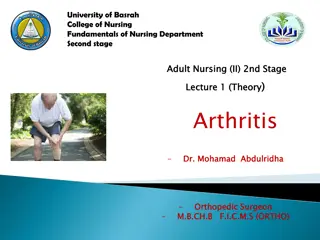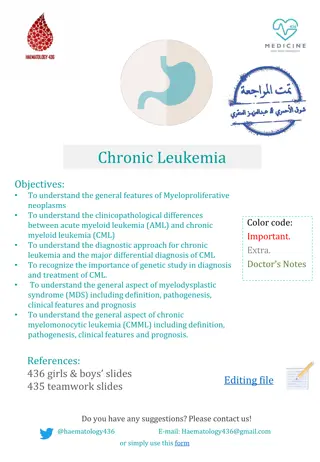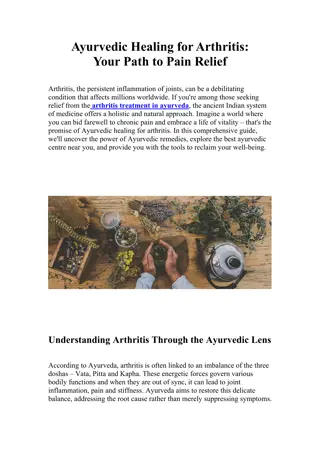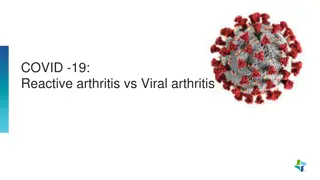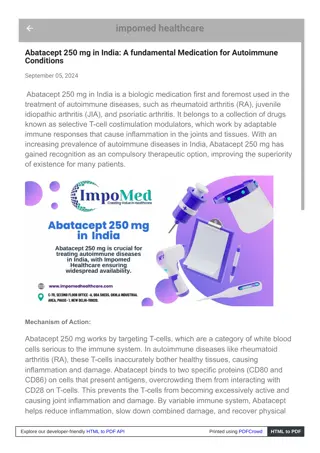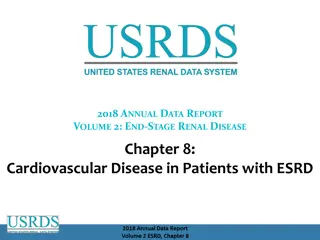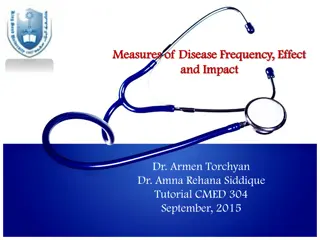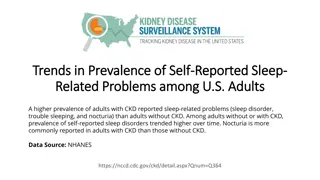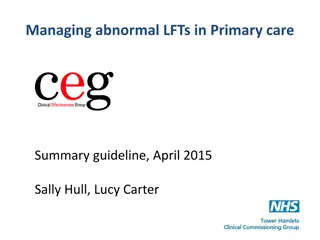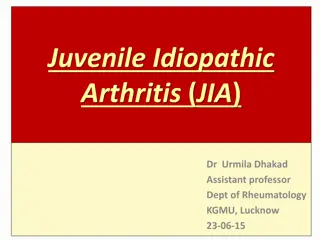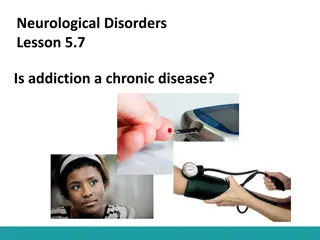Arthritis Prevalence in New York Among General Adult Population and Those with Chronic Disease Risk Factors
The statistics present the prevalence of arthritis among adults in the United States, with a focus on New York. Over 52.5 million adults in the US have been diagnosed with various forms of arthritis. The data includes information on risk factors such as being overweight, obese, physically inactive, or smokers. The prevalence of arthritis varies across different age groups and demographics. The visual representation of the data provides valuable insights into the impact of arthritis on the general adult population and those with chronic disease risk factors.
Download Presentation

Please find below an Image/Link to download the presentation.
The content on the website is provided AS IS for your information and personal use only. It may not be sold, licensed, or shared on other websites without obtaining consent from the author. Download presentation by click this link. If you encounter any issues during the download, it is possible that the publisher has removed the file from their server.
E N D
Presentation Transcript
DANIEL LEFFINGWELL MARCH 10 2020
Statistics An estimated 52.5 million adults in the United States reported being told by a doctor that they have some form of arthritis, rheumatoid arthritis, gout, lupus, or fibromyalgia. An estimated 27 million adults had osteoarthritis in 2005 Of people aged 65 years or older, 49.6% ever reported doctor-diagnosed arthritis Nearly 1 in 2 people may develop symptomatic knee osteoarthritis by age 85 years.
Statistics (cont.) From 2013 2015, an estimated 54.4 million US adults (22.7%) annually had ever been told by a doctor that they had some form of arthritis, rheumatoid arthritis, gout, lupus, or fibromyalgia About 1 out of every 5 US adults has doctor-diagnosed arthritis. The term arthritis includes more than 100 different rheumatic diseases and conditions, the most common of which is osteoarthritis. By 2040, an estimated 78 million (26%) US adults aged 18 years or older are projected to have doctor-diagnosed arthritis.
In New York, how common is arthritis among the general adult population compared with arthritis prevalence among adults with risk factors for chronic disease? Table 5b. Prevalence of arthritis1 among all adults, and adults who are overweight2, obese2, inactive3, or who smoke4, by selected characteristics. Behavioral Risk Factor Surveillance System, New York, 2015. Prevalence of Arthritis Among Adults Who Are: Prevalence of Arthritis Among All Adults SmokersOverweight Physically InactiveObese Characteristic Adults (1,000s) (%)5 95% CI6 Adults (1,000s) (%)7 95% CI Total 3629 23.4 (22.5-24.3) 1147 23.7 (22.1-25.4) 95% CI Adults (1,000s) (%)8 95% CI Adults (1,000s) (%)9 95% CI Adults (1,000s) (%)10 1221 34.6 (32.4-36.9) 1241 29.0 (27.1-31.0) 597 27.0 (24.3-29.9) Age Group (Years) 18-44 527 45-64 1524 65-74 816 75+ 715 7.4 29.8 (6.4-8.5) 115 (28.1-31.4) 6.0 484 (4.5-7.9) 218 27.6 15.7 (12.5-19.6) 545 166 (35.3-42.0) 9.4 (7.2-12.2) 194 552 17.2 (32.9-39.7) (13.5-21.6) (24.8-30.6) 38.6 36.3 306 36.7 (32.5-41.2) 48.0 (45.3-50.8) 281 44.0 (39.5-48.7) 276 62.7 (57.5-67.6) 260 52.8 (47.5-58.0) 71 41.8 (33.7-50.4) 54.3 (51.1-57.5) 257 54.1 (48.8-59.4) 179 68.4 (61.0-75.0) 254 56.8 (51.0-62.4) 25 38.8 (24.8-54.9) 18-64 65+ 2051 16.7 (15.8-17.7) 599 16.3 (14.6-18.1) 764 27.3 (24.9-29.8) 718 21.8 (19.7-24.0) 500 25.5 (22.6-28.7) 1531 50.8 (48.7-52.9) 538 48.3 (44.9-51.8) 455 64.8 (60.6-68.8) 515 54.7 (50.8-58.6) 96 41.0 (33.7-48.7) Sex Female 2217 Male 27.4 (26.1-28.7) 597 28.8 (26.2-31.6) 733 41.5 (38.5-44.5) 806 34.0 (31.4-36.7) 341 34.8 (30.7-39.2) 1412 19.0 (17.8-20.3) 550 19.9 (18.0-22.0) 488 27.7 (24.7-31.0) 435 22.9 (20.1-25.9) 256 20.8 (17.3-24.8) Race/Ethnicity White, Non-Hispanic (26.6-33.8) Black, Non-Hispanic (18.9-33.9) Hispanic 440 2409 28.0 (26.9-29.2) 775 28.0 (26.0-30.1) 771 39.6 (36.9-42.4) 785 36.0 (33.4-38.6) 395 30.1 447 20.9 (18.5-23.6) 155 23.2 (18.9-28.1) 177 29.0 (23.9-34.7) 161 26.4 (21.4-32.0) 79 25.7 16.3 (14.3-18.6) 107 13.2 (10.3-16.9) 182 26.6 (21.7-32.3) 195 20.2 (16.5-24.6) 72 20.4 (14.3-28.3) Other 243 15.5 (12.4-19.2) 84 19.0 (12.7-27.5) 63 34.9 (23.3-48.6) 79 20.1 (13.3-29.2) 38 21.3 (12.1-34.6)
What Can I Do? If you have Arthritis, there are a number of things you can do to manage your symptoms and improve your quality of life.
Physical Body Modifications: control your weight to ease pressure on your joints avoid stress or injury to your joints to prevent or reduce the severity of osteoarthritis ensure good posture to strengthen healthy joint structure use physiotherapy and a walking stick or cane to help prevent your condition getting worse ensure that you regularly undertake weight-bearing exercise, such as walking, to help prevent osteoarthritis. This type of exercise will increase the strength of the muscles that support your joints.
Physical Body Modifications: Exchange high heels for flats high heels are bad for your posture and make you more prone to falling, so wear flat, comfortable footwear. Don t drink too much alcohol alcohol can affect your balance, making you more likely to fall. Check your sight as you get older, you will probably experience some deterioration in your eyesight. It is important to get your sight checked regularly by a qualified optician. Poor eyesight can increase your risk of accident and injury.
The Role of Exercise The role of swimming and even modified weight lifting to strengthen the muscles and support joints. The American College of Sports Medicine now recommends weight training for all people over 50, and even people well into their 90s can benefit. A group of nursing home residents ranging in age from 87 to 96 improved their muscle strength by almost 180 percent after just eight weeks of weightlifting, also known as strength training. Adding that much strength is almost like rolling back the clock. Even frail elderly people find their balance improves, their walking pace quickens, and stairs become less of a challenge.
How to Adapt your Home key turners and door knob covers pull down door handles specially designed scissors with large handles book holders to avoid strain on the wrists and joints pick-up reachers (a tong-like implement that makes reaching for and grasping objects easier) rubber grips for pens and pencils. These mean you will not have to grip as hard
How to Adapt your Home ejector seat chairs, which may help people with limited mobility light, long-handled brooms and dustpans to avoid bending. Eliminate home hazards always keep your home well lit and remove all loose wires and cords that you may trip over. Make sure treads, rugs and carpets are secure. Keep rubber mats by the sink and in the bath to prevent slipping and always clean up spills immediately.
How to Adapt your Home Install grab rails in the bathroom and toilet to help you stand up without falling. Your doctor may be able to provide support and advice about safety in the home. Improve your balance exercise that helps improve your balance can prevent falls. Ideal forms of exercise for improving balance include tai chi, yoga and dance. Get ideas from the audience
Medical Treatments Ask the audience for a list of treatments that they have tried. Heat paraffin wax Acupuncture Herbal medicines (always report these to your doctor) Traditional Medicines NSAIDS, COX inhibiters, Biologics (Humira story)
Analgesics (Pain Relievers) Brand Name Advil, Motrin, Medipren, Nuprin Aspirin, Bayer, Ectorin Darvon Darvocet, Wygesic Empirin#2,3,4;Tylenol#2,3,4; Tylenol w/ Codeine Naprosyn, Naprelan, Anaprox, Aleve Orudis, Oruvail Oxycontin, Roxicodone Percocet, Roxicet, Tylox Tylenol Generic Name ibuprofen aspirin propoxyphene propoxyphene and acetaminophen codeine naproxen ketoprofen oxycodone oxycodone and acetaminophen acetaminophen Arthritis Medications. (2018, June 13). Retrieved March 09, 2020, from https://www.medicinenet.com/arthritis_medications/views.htm
Biological Response Modifiers (BRMs or DMARDs) Brand Name Generic Name Enbrel etanercept Humira adalimumab Kineret anakinra Orencia abatacept Remicade infliximab Arthritis Medications. (2018, June 13). Retrieved March 09, 2020, from https://www.medicinenet.com/arthritis_medications/views.htm
Disease-Modifying Antirheumatic Drugs or DMARDs Brand Name Arava Azulfidine Cuprimine, Depen Enbrel Humira Imuran Plaquenil Remicade Rheumatrex Ridaura Solganal Generic Name leflunomide sulfasalazine penicillamine etanercept adalimumab azathioprine hydroxychloroquine infliximab methotrexate auranofin aurothiglucose Arthritis Medications. (2018, June 13). Retrieved March 09, 2020, from https://www.medicinenet.com/arthritis_medications/views.htm
Glucocorticoids (Corisone-Related Drugs) Brand Name Generic Name Corticosteroid Injection of Soft Tissues & Joints Cortisone Injection Decadron dexamethasone, oral Deltasone, Liquid Pred prednisone, oral Prednisolone, Pediapred Oral Liquid, Medrol prednisolone Hydrocortone, Cortef hydrocortisone, oral Medrol methylprednisolone Arthritis Medications. (2018, June 13). Retrieved March 09, 2020, from https://www.medicinenet.com/arthritis_medications/views.htm
NSAIDs (Nonsteroidal Anti-inflammatory Drugs) Brand Name Generic Name Advil, Motrin, Medipren, Nuprin ibuprofen Ansaid flurbiprofen Aspirin, Bayer, Ecotrin aspirin Celebrex celecoxib Clinoril sulindac Daypro oxaprozin Disalcid, Salflex salsalate Feldene piroxicam Indocin, Indocin-sr indomethacin Lodine etodolac Meclomen meclofenamate Mobic meloxicam Nalfon fenoprofen Naprosyn, Naprelan, Anaprox, Aleve naproxen Arthritis Medications. (2018, June 13). Retrieved March 09, 2020, from https://www.medicinenet.com/arthritis_medications/views.htm
References Arthritis-Related Statistics | Data and Statistics | Arthritis | CDC. (n.d.). Retrieved November 02, 2018, from https://www.cdc.gov/arthritis/data_statistics/arthritis-related-stats.htm How to live with arthritis. (n.d.). Retrieved November 02, 2018, from https://www.healthdirect.gov.au/how-to-live-with-arthritis Physical Activity. (2018, October 26). Retrieved November 02, 2018, from https://www.cdc.gov/physicalactivity/ Arthritis-Related Statistics | Data and Statistics | Arthritis | CDC. (n.d.). Retrieved May 06, 2019, from https://www.cdc.gov/arthritis/data_statistics/arthritis-related-stats.htm Arthritis Medications. (2018, June 13). Retrieved March 09, 2020, from https://www.medicinenet.com/arthritis_medications/views.htm Ratini, M. (2018, September 04). Rheumatoid Arthritis Drug Guide: Types of Drugs, Uses, Side Effects. Retrieved March 09, 2020, from https://www.webmd.com/rheumatoid-arthritis/rheumatoid-arthritis- medications 1. 2. 3. 4. 5. 6.


